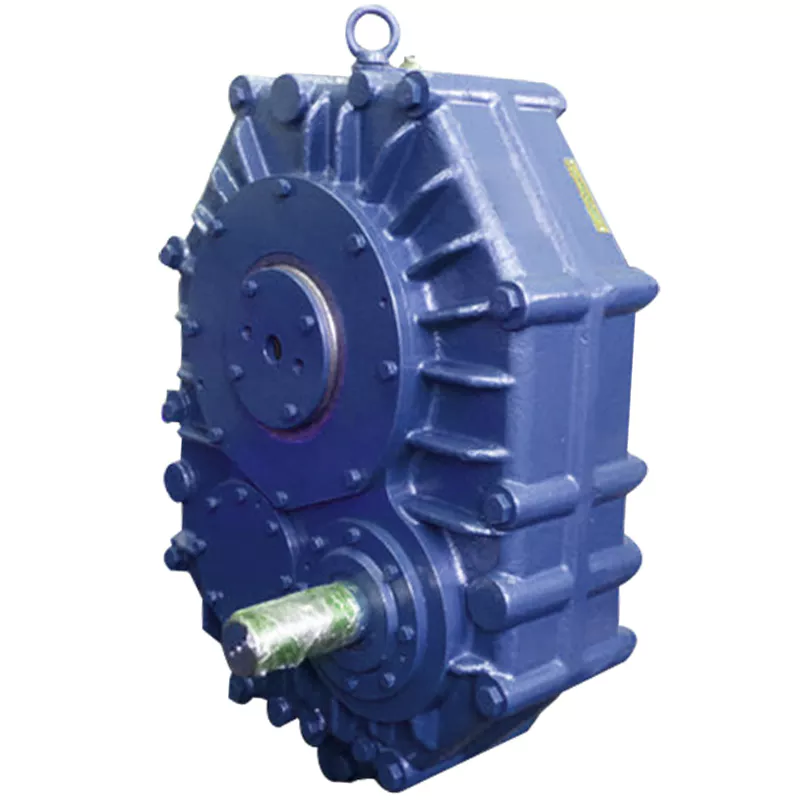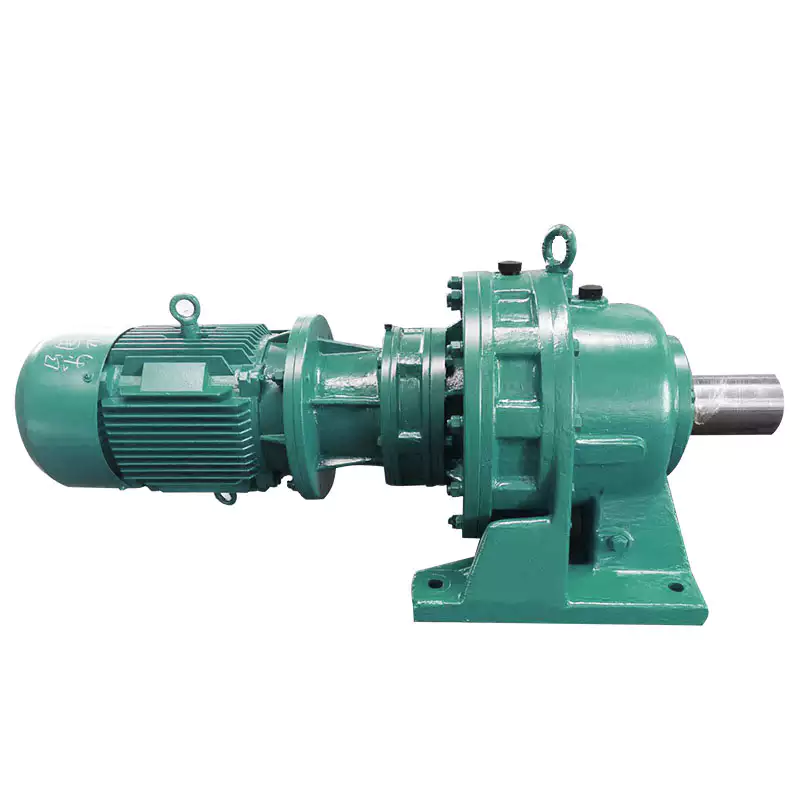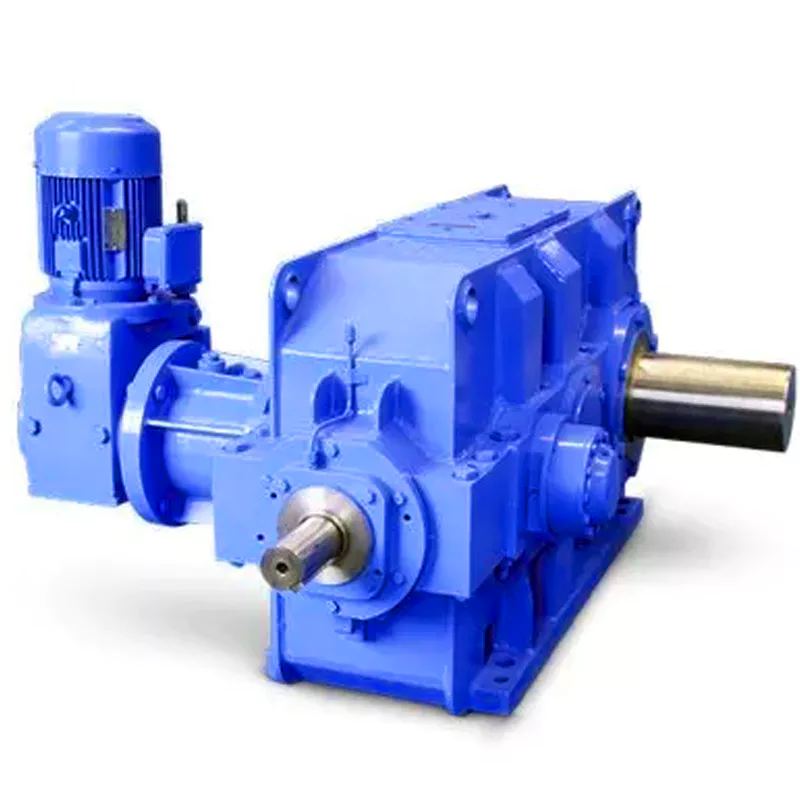คำอธิบายผลิตภัณฑ์
Dr Drawing
High Torque R F K S Series Large Industrial Gear Reducer Industrial Equipment Heavy High Speed Reducer
1. Low noise
2. High performance
3. German technology Base support
4. Manufacturing
5. High standard modular design
6. Assembly arrangements
7. High strength, compact dimension
8. Large radial charging capability
9. low temperature/low energy consumption
10.High transmission efficiency, superior performance:
(1)The cast box is made of high-strength grey cast iron HT250 and ball ground cast iron, and the small and medium box is made of integral structure, with good rigidity, excellent anti-vibration performance, improved wave strength and extended service life
(2)The gear material is processed by 20CrMnTi + carbonization process. The hardness of the tooth surface reaches 58~62HRC
(3)The shaft is made of alloy steel, adopts a 40Cr + high frequency quenching and tempering treatment, and the oil seal position adopts radial grinding to improve wear resistance and reduce the risk of oil leakage
(4)Bearings, oil seals and other standard parts,which are used at home and abroad famous brand products
(5)100% strict ex-factory inspection
|
Type |
R/RX/RF/RXF Series |
F/FA/FF/FAF Series |
K/KA/KF/KAF Series |
S/SA/SF/SAF Series |
|
Gearbox size |
37 ~ 167 |
37 ~ 157 |
37 ~ 187 |
37 ~ 97 |
|
Motor power range(KW) |
0.12 ~ 160 |
0.12 ~ 200 |
0.12 ~ 200 |
0.12 ~ 22 |
|
Ratio range |
3.41 ~ 20000 |
3.41 ~ 14000 |
3.41 ~ 18000 |
3.41 ~ 25000 |
|
Output speed(RPM) |
0.18 ~ 470 |
0.09 ~ 470 |
0.09 ~ 470 |
0.05 ~ 470 |
|
Output torque(N.m) |
61 ~ 13000 |
61 ~ 12000 |
61 ~ 8000 |
90 ~ 11000 |
ra
wn
/* 10 มีนาคม 2571 17:59:20 */!function(){function s(e,r){var a,o={};try{e&&e.split(“,”).forEach(function(e,t){e&&(a=e.match(/(.*?):(.*)$/))&&1
| แอปพลิเคชัน: | Industrial |
|---|---|
| Speed: | Low Speed |
| Number of Stator: | Three-Phase |
| การทำงาน: | Driving, Control |
| Casing Protection: | Protection Type |
| Number of Poles: | 4 |
| ตัวอย่าง: |
US$ 200/Piece
1 ชิ้น (สั่งซื้อขั้นต่ำ) | |
|---|
| การปรับแต่ง: |
มีอยู่
| คำขอที่กำหนดเอง |
|---|

Are there any disadvantages or limitations to using gear reducer systems?
While gear reducer systems offer numerous advantages, they also come with certain disadvantages and limitations that should be considered during the selection and implementation process:
1. Size and Weight: Gear reducers can be bulky and heavy, especially for applications requiring high gear ratios. This can impact the overall size and weight of the machinery or equipment, which may be a concern in space-constrained environments.
2. Efficiency Loss: Despite their high efficiency, gear reducers can experience energy losses due to friction between gear teeth and other components. This can lead to a reduction in overall system efficiency, particularly in cases where multiple gear stages are used.
3. Cost: The design, manufacturing, and assembly of gear reducers can involve complex processes and precision machining, which can contribute to higher initial costs compared to other power transmission solutions.
4. Maintenance: Gear reducer systems require regular maintenance, including lubrication, inspection, and potential gear replacement over time. Maintenance activities can lead to downtime and associated costs in industrial settings.
5. Noise and Vibration: Gear reducers can generate noise and vibrations, especially at high speeds or when operating under heavy loads. Additional measures may be needed to mitigate noise and vibration issues.
6. Limited Gear Ratios: While gear reducers offer a wide range of gear ratios, there may be limitations in achieving extremely high or low ratios in certain designs.
7. Temperature Sensitivity: Extreme temperatures can affect the performance of gear reducer systems, particularly if inadequate lubrication or cooling is provided.
8. Shock Loads: While gear reducers are designed to handle shock loads to some extent, severe shock loads or abrupt changes in torque can still lead to potential damage or premature wear.
Despite these limitations, gear reducer systems remain widely used and versatile components in various industries, and their disadvantages can often be mitigated through proper design, selection, and maintenance practices.

What role do gear ratios play in optimizing the performance of gear reducers?
Gear ratios play a crucial role in optimizing the performance of gear reducers by determining the relationship between input and output speeds and torques. A gear ratio is the ratio of the number of teeth between two meshing gears, and it directly influences the mechanical advantage and efficiency of the gear reducer.
1. Speed and Torque Conversion: Gear ratios allow gear reducers to convert rotational speed and torque according to the needs of a specific application. By selecting appropriate gear ratios, gear reducers can either reduce speed while increasing torque (speed reduction) or increase speed while decreasing torque (speed increase).
2. Mechanical Advantage: Gear reducers leverage gear ratios to provide mechanical advantage. In speed reduction configurations, a higher gear ratio results in a greater mechanical advantage, allowing the output shaft to deliver higher torque at a lower speed. This is beneficial for applications requiring increased force or torque, such as heavy machinery or conveyor systems.
3. Efficiency: Optimal gear ratios contribute to higher efficiency in gear reducers. By distributing the load across multiple gear teeth, gear reducers with suitable gear ratios minimize stress and wear on individual gear teeth, leading to improved overall efficiency and prolonged lifespan.
4. Speed Matching: Gear ratios enable gear reducers to match the rotational speeds of input and output shafts. This is crucial in applications where precise speed synchronization is required, such as in conveyors, robotics, and manufacturing processes.
When selecting gear ratios for a gear reducer, it’s important to consider the specific requirements of the application, including desired speed, torque, efficiency, and mechanical advantage. Properly chosen gear ratios enhance the overall performance and reliability of gear reducers in a wide range of industrial and mechanical systems.

What are the benefits of using a gear reducer in industrial applications?
Gear reducers offer several benefits that make them indispensable in various industrial applications:
1. Speed Reduction: Gear reducers allow the reduction of high-speed input from motors or engines to lower, more usable output speeds for specific applications, ensuring proper equipment operation and safety.
2. Torque Increase: By leveraging the mechanical advantage of gear ratios, gear reducers can significantly increase torque output, enabling the handling of heavy loads and providing the necessary power for tasks such as lifting, conveying, and processing.
3. Precise Control: Gear reducers enable fine-tuning of rotational speed and torque, providing precise control over machinery and processes, which is crucial in industries like manufacturing, material handling, and robotics.
4. Shock Load Absorption: Gear reducers can absorb and dampen sudden shocks or changes in load, protecting both the machinery and connected components from abrupt forces that could otherwise lead to damage.
5. Versatility: With various gear types (e.g., spur, helical, worm) and designs, gear reducers can be tailored to different applications, including those requiring specific speed ratios, torque ranges, and environmental conditions.
6. Efficient Power Transmission: Gear reducers offer high mechanical efficiency, minimizing energy loss during power transmission, which is especially valuable in energy-conscious industries.
7. Compact Design: Gear reducers provide a compact solution for transmitting power and adjusting speeds, making them suitable for installations with space constraints.
8. Reliability and Longevity: Well-designed and properly maintained gear reducers can offer extended service life, contributing to reduced downtime and maintenance costs.
Overall, gear reducers enhance the performance, efficiency, and reliability of industrial equipment, making them essential components in a wide range of applications across various industries.


editor by CX 2024-02-18